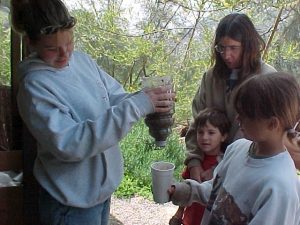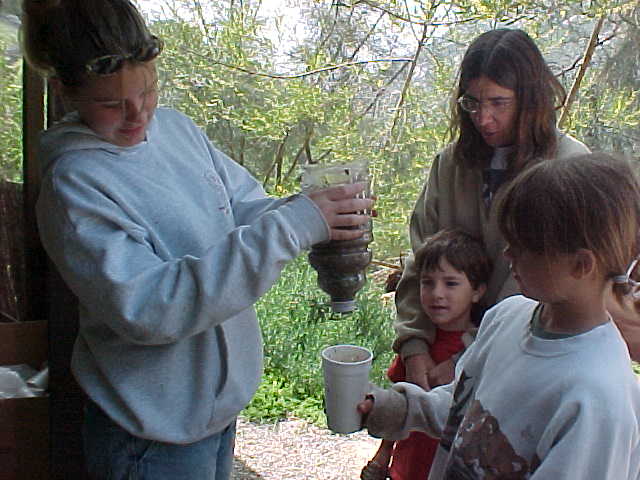I was doing some errands yesterday that prompted me to travel a couple of exits on I-95 where it passes through my part of Virginia. It’s the main north-south highway running from Florida all the way to Maine and was as crowded heading north at noon as during the typical rush hour traffic on any weekday morning with all the people evacuating from the areas predicted to take the biggest hit from Hurricane Florence. Fortunately, I was on and off the interstate within a couple of exits.
After getting off the highway I stopped off at the supermarket for a lottery ticket and a few small items. The guy at the customer service counter told me the store was completely sold out of bottled water, as were Walmart, Weiss, and several other stores he named. I just grinned and shook my head at the typical last minute panic shopping because we have several hundred gallons of drinking water stored, along with a nice variety of foods, camping gear, batteries, medicines and just about everything else we would need to live for a considerable time with no outside support.
But it did make me wonder about all those people crowded into those cars standing still on the interstate. How prepared were most of them? And more important, how prepared are you? The two items that always sell out first as an emergency approaches are batteries and drinking water. And if you wait until the crisis is looming, you are going to be running around fighting the panicked crowds to find what you should have had stored all along. And that’s assuming you have enough advance warning to do even that.
If you’re an avid ‘Self-Reliance Central’ reader like I am, you probably…hopefully…read the article ‘Survival lessons learned: “Water is more important than an AR-15”’ that was posted a recently. If you haven’t, I strongly recommend that you do. Human beings can easily live a couple of weeks without food but can only live about three days without water. And a human dying of thirst will often drink anything that they think might ease that thirst and sustain them, and in doing so often poison themselves.
Unless you live in the desert water can be obtained in a lot of places, especially during a hurricane in times of heavy rain. Unfortunately, that water is usually unfit for human consumption. So, how do we ensure we’re prepared to assure we and our loved ones have a reliable source of safe drinking water? Conventional wisdom states that we should store enough water to provide a gallon of potable water per day to each person in your group. Happily, that means my wife and I are good for about 200 days just on what we have stored but not everyone has that much stored.
Safe Water
- Obviously, the first thing to do is store all the clean water you can. Next, look at what sources of water you can tap into. As soon as you know that there could be a power outage or some other break in the supply of water, fill everything in your home. Sinks, bathtubs, buckets, jugs, and anything else that will hold water. Of course, if you have a well with a hand powered pump, then you’re in pretty good shape.
- Water can be obtained from a number of outside sources like rain runoff, ditches, and puddles but we need to have a stock of purification measures on hand. Yes, we can buy Berkey water filters, and they are great but will quickly clog if the water you are filtering is filled with sediment so it’s important to have rough filtration sources like cheesecloth and coffee filters available to get the big pieces out and make life easier for our finer filters.
- Learn to use easily available materials. An excellent and effective filter can be made by
 using washed charcoal and fine sand in a container of some sort. Take a one gallon water or juice jug and poke small holes in the lid. Push a layer of clean charcoal through the neck and then add a few inches of sand. Get the sand at Lowe’s (the stuff for mixing concrete, or playground sand works fine and is very cheap.) Sieve water with a lot of sediment or debris in it through cheesecloth or a coffee filter, first, then run it through your homemade filter by turning it upside down so the water comes out of the lip, and you will have clear water.
using washed charcoal and fine sand in a container of some sort. Take a one gallon water or juice jug and poke small holes in the lid. Push a layer of clean charcoal through the neck and then add a few inches of sand. Get the sand at Lowe’s (the stuff for mixing concrete, or playground sand works fine and is very cheap.) Sieve water with a lot of sediment or debris in it through cheesecloth or a coffee filter, first, then run it through your homemade filter by turning it upside down so the water comes out of the lip, and you will have clear water. - Once you’ve filtered water, add a few drop of a common water purifier such as halazone, iodine or just plain old chlorine bleach. About 7 drops of bleach per gallon of water will do the trick, just don’t use scented or fabric softener bleach. Just use plain old chlorine bleach. AND ALWAYS CONSIDER THE SOURCE OF THE WATER. PESTICIDES AND CHEMICALS WILL NOT BE FILTERED OUT.
- You can always boil water, but that will use up fuel (propane, Coleman Fuel or whatever) so you have to decide if you have enough for the purpose. If you do boil water, filter it through some kind of cloth or filter first and then be sure to bring it to a rolling boil and keep it there for at least two minutes, at least three at higher altitudes.
Training is the Most Important Preparation
People are great at making lists of the things they need, and some are even good at filling out the items in those lists. But no item, no matter how necessary, will do you any good if you don’t know how to use it. One of the most important things you can do to prepare is to learn and get training.
You have a great first aid kit? Do you know how to use everything in it? You have suture sets to stitch up serious wounds, (or know how?)a CPR mask, a tourniquet, antibiotics? Do you know how to use everything and which antibiotics are good for what? Colloidal silver? Do you have inflatable splints and materials to set a broken bone? How about emergency dental kits? Do you know how to use them?
If you can’t answer yes to all of these questions, you need to get some training. Stocking up on water, food, batteries, camping gear and guns are all critical preparations, but training is by far the most valuable preparation you can make. And be sure you aren’t the only person who is trained. I was doing a security assessment on an office in Amman, Jordan once, and I asked the staff if they had a good first aid kit, and if they knew how to use it. They proudly said they had an excellent kit and one of their staff was a trained EMT. When I smiled and asked what if he was the person suffering the medical emergency, all I got for an answer was a loud silence. Always have a back-up.
I’m sure a lot of you have great ideas that will help people prepare, so tell us about them. Let’s help each other out and fill the comments section with concrete and useful ideas we all can use. ~ Mike
© 2018 by Mike McMaken for Self-Reliance Central. Mike is a US Army veteran with over 30 years of military, law enforcement and private security experience. He spent several years in Iraq as a security contractor and has made trips into many of the world’s most “challenging” places.

